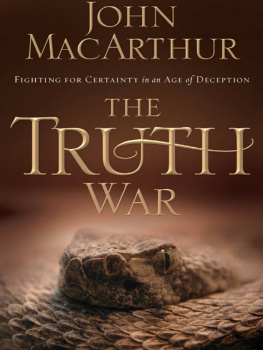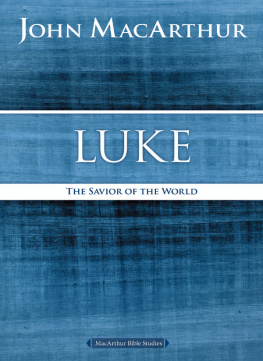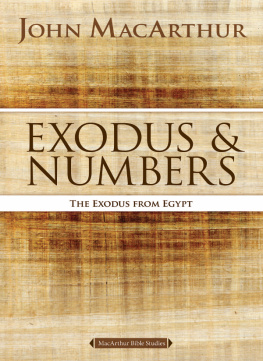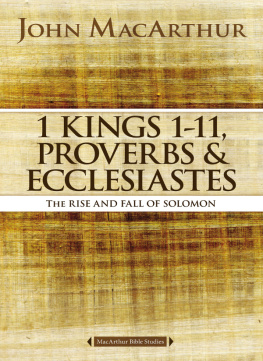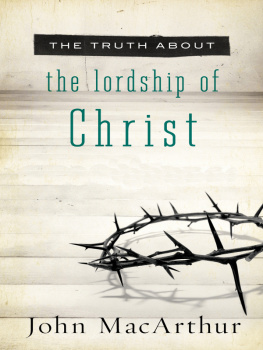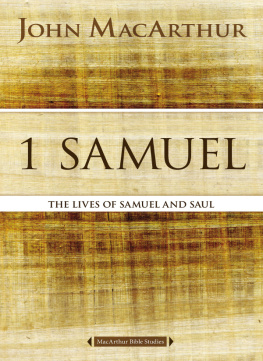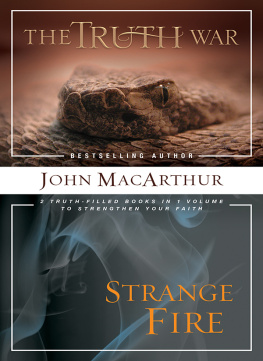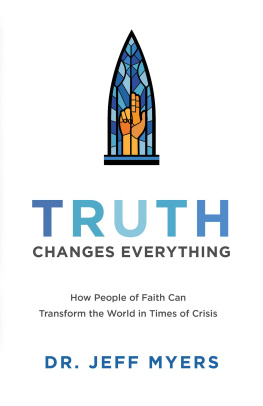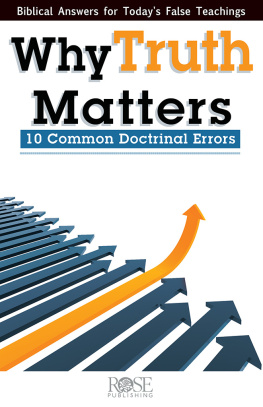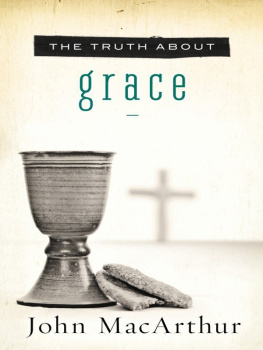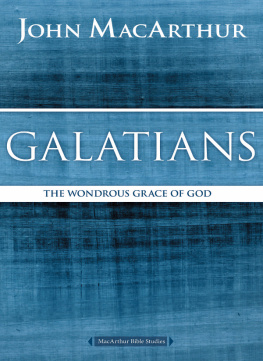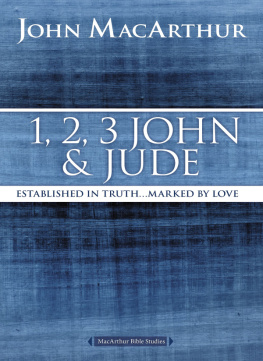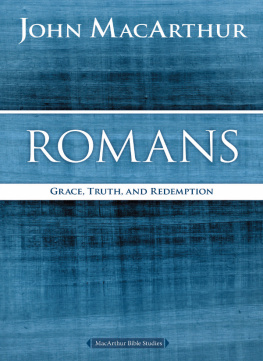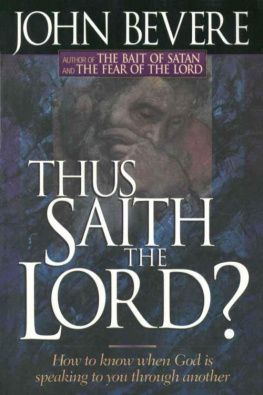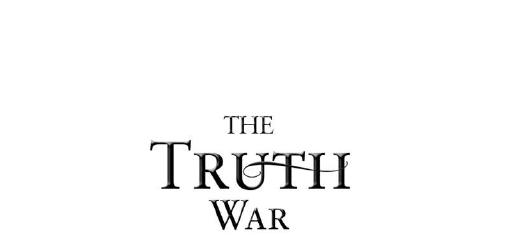
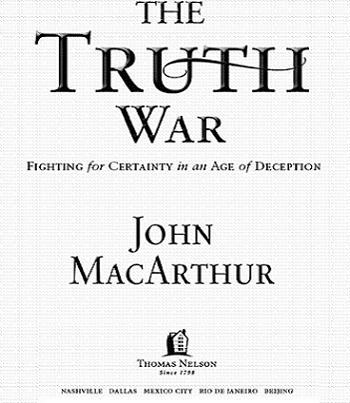
2007 by John MacArthur
All rights reserved. No portion of this book may be reproduced, stored in a retrieval system, or transmitted in any form or by any meanselectronic, mechanical, photocopy, recording, or any otherexcept for brief quotations in printed reviews, without the prior written permission of the publisher.
Published in Nashville, TN, by Thomas Nelson. Thomas Nelson is a trademark of Thomas Nelson, Inc.
Thomas Nelson, Inc. titles may be purchased in bulk for educational, business, fund-raising, or sales promotional use. For information, please e-mail SpecialMarkets@ThomasNelson.com.Thomas Nelson, Inc. titles may be purchased in bulk for educational, business, fund-raising, or sales promotional use. For information, please e-mail SpecialMarkets@ThomasNelson.com.
All Scripture quotations, unless otherwise indicated, are from The New King James Version, copyright 1979, 1980, 1982, Thomas Nelson, Inc., Publishers.
Scriptures marked KJV are from the King James Version of the Bible.
Scriptures marked NASB are from the New American Standard Bible. Copyright 1960, 1962, 1963, 1968, 1971, 1972, 1973, 1975, 1977, 1995 by the Lockman Foundation. Used by permission.
Scriptures marked NIV are from The Holy Bible, New International Version. Copyright 1973, 1978, 1984, International Bible Society. Used by permission of Zondervan.
Library of Congress Cataloging-in-Publication Data
MacArthur, John, 1939
The truth war : fighting for certainty in an age of deception / John MacArthur.
p. cm.
ISBN-13: 978-0-7852-6263-3 (hardcover)
ISBN-10: 0-7852-6263-6 (hardcover)
1. Truth--Religious aspects--Christianity. 2. Evangelicalism. 3. Christian life. I. Title.
BV4509.5.M253 2007
239dc22
2006032323
Printed in the United States of America
07 08 09 10 11 12 QW 12 11 10 9 8 7 6 5
Through the years my partnership with Phil Johnson
has proven to be divinely ordained. The contribution of his
theological knowledge, clear thinking, and strong conviction
has been essential to the success of our collaboration
in projects like these. I owe Phil a deep debt of gratitude
for his considerable editorial efforts in this book.

THE Church of Christ is continually represented under the figure of an army; yet its Captain is the Prince of Peace; its object is the establishment of peace, and its soldiers are men of a peaceful disposition. The spirit of war is at the extremely opposite point to the spirit of the gospel.
Yet nevertheless, the church on earth has, and until the second advent must be, the church militant, the church armed, the church warring, the church conquering. And how is this?
It is in the very order of things that so it must be. Truth could not be truth in this world if it were not a warring thing, and we should at once suspect that it were not true if error were friends with it. The spotless purity of truth must always be at war with the blackness of heresy and lies.
C. H. SPURGEON
CONTENTS

Who would have thought that people claiming to be Christianseven pastorswould attack the very notion of truth?
But they are.
A recent issue of Christianity Today featured a cover article about the Emerging Church. That is the popular name for an informal affiliation of Christian communities worldwide who want to revamp the church, change the way Christians interact with their culture, and remodel the way we think about truth itself. The article included a profile of Rob and Kristen Bell, the husband and wife team who founded Mars Hilla very large and steadily growing Emerging community in Grand Rapids, Michigan. According to the article, the Bells
found themselves increasingly uncomfortable with church. Life in the church had become so small, Kristen says. It had worked for me for a long time. Then it stopped working. The Bells started questioning their assumptions about the Bible itselfdiscovering the Bible as a human product, as Rob puts it, rather than the product of divine fiat. The Bible is still in the center for us, Rob says, but its a different kind of center. We want to embrace mystery, rather than conquer it. I grew up thinking that weve figured out the Bible, Kristen says, that we knew what it means. Now I have no idea what most of it means. And yet I feel like life is big againlike life used to be black and white, and now its in color.
One dominant theme pervades the whole article: in the Emerging Church movement, truth (to whatever degree such a concept is even recognized) is assumed to be inherently hazy, indistinct, and uncertainperhaps even ultimately unknowable.
THE IDEA THAT
THE CHRISTIAN
MESSAGE SHOULD BE
KEPT PLIABLE AND
AMBIGUOUS
SEEMS ESPECIALLY
ATTRACTIVE TO
YOUNG PEOPLE
WHO ARE IN TUNE
WITH THE CULTURE
AND IN LOVE
WITH THE SPIRIT
OF THE AGE.
Each of the Emerging Church leaders profiled in the article expressed a high level of discomfort with any hint of certainty about what the Bible means, even on something as basic as the gospel. Brian McLaren, for instance, is a popular author and former pastor who is the best-known figure and one of the most influential voices in the Emerging Church movement. McLaren is quoted in the Christianity Today article, saying at one point: I dont think weve got the gospel right yet.... I dont think the liberals have it right. But I dont think we have it right either. None of us has arrived at orthodoxy.
Elsewhere, McLaren likens the conventional notion of orthodoxy to a claim that we have the truth captured, stuffed, and mounted on the wall.
That is very popular stuff these days. McLaren alone has written or coauthored about a dozen books, and his utter contempt for certainty is a motif he returns to again and again. In 2003 Zondervan and Youth Specialties teamed up to start a line of products called Emergent/YS. They publish books, DVDs, and audio products at a prolific rate, with titles ranging from Rob Bells Velvet Elvis: Repainting the Christian Faith to Adventures inMissing the Point, an aptly titled collaboration of Brian McLaren and Tony Campolo.
The idea that the Christian message should be kept pliable and ambiguous seems especially attractive to young people who are in tune with the culture and in love with the spirit of the age and cant stand to have authoritative biblical truth applied with precision as a corrective to worldly lifestyles, unholy minds, and ungodly behavior. And the poison of this perspective is being increasingly injected into the evangelical church body.
But that is not authentic Christianity. Not knowing what you believe (especially on a matter as essential to Christianity as the gospel) is by definition a kind of unbelief. Refusing to acknowledge and defend the revealed truth of God is a particularly stubborn and pernicious kind of unbelief. Advocating ambiguity, exalting uncertainty, or otherwise deliberately clouding the truth is a sinful way of nurturing unbelief.
Every true Christian should know and love the truth. Scripture says one of the key characteristics of those who perish (people who are damned by their unbelief) is that they did not receive the love of the truth, that they might be saved (2 Thessalonians 2:10). The clear implication is that a genuine love for the truth is built into saving faith. It is therefore one of the distinguishing qualities of every true believer. In Jesus words, they have known the truth, and the truth has set them free (John 8:32).
Next page
